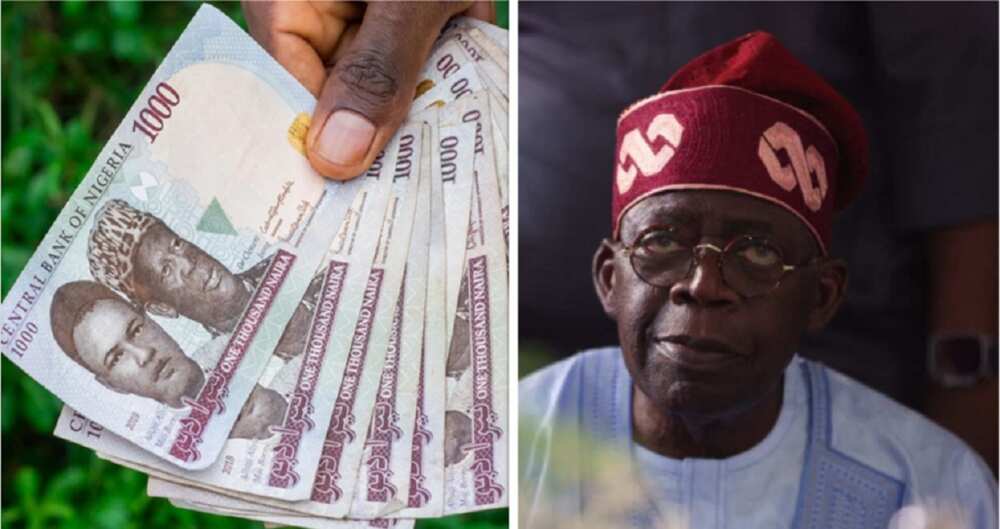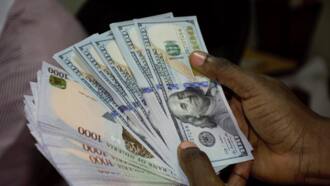Nigeria’s External Reserve Declines by $167m Amid Fall in Naira
- Due to the continuous fall of the naira, the external reserve has declined by $167.2 million
- Consequently, Aminu Gwadabe, the president of the Association of Bureau de Change Operators of Nigeria, said the growth of external reserves remains sluggish because of foreign exchange demand
- Gwadabe added that foreign financing is required to increase liquidity to assuage the local currency
PAY ATTENTION: Fuel your passion for sports with SportBrief.com. Click here to discover the latest sports updates!
As the naira continued to depreciate against the dollar in July, the nation's foreign reserves lost $167.2 million.
Data on the movement of the foreign exchange reserves obtained from the Central Bank of Nigeria (CBN) revealed that the funds, which stood at $34.12 billion on June 30, 2023, had decreased to $33.95 billion as of July 28, 2023.
This is riding on the back of a fall in the value of the country’s currency as the naira dropped from 820/$ to 868/$ over the past two weeks on Monday at the parallel market.
Also, naira trading at the I&E window on the FMDQ started at 784.91/$ and ended at 756/$ after reaching an all-time high of 830/$.

Source: UGC
PAY ATTENTION: Join Legit.ng Telegram channel! Never miss important updates!
Legit.ng earlier reported that Nigeria’s foreign reserves, which give the CBN the firepower to defend the naira, have declined to a two-year low.
According to the latest data from CBN's website, Nigeria's foreign reserves dropped to $33.98 billion on Wednesday, July 19, 2023.
This is the lowest Nigeria's foreign reserve has reached since August 30, 2021, when it was $33.93 billion.
The country's reserves have been spiraling despite expectations that the CBN's decision to float the naira would lower the pressure on the foreign reserves.
Growing demand for dollar
Aminu Gwadabe, the president of the Association of Bureau de Change Operators of Nigeria, told Punch that the continued lack of trust in the local currency is causing optimism to give way to pessimism, which is further encouraging hoarding and speculating of the forex holding position.
He said the market's supply of dollars is under pressure from the growing demand from oil marketers, investors' backlog, school tuition, and travellers.
Gwadabe asserted that either bilaterally or multilaterally, further foreign financing is required to increase liquidity to assuage the local currency's impending crisis.
Meanwhile, the acting governor of the CBN, Folashodun Shonubi, during the most recent meeting of the Monetary Policy Committee in Abuja, stated that the bank would address the demand pressure on the country's currency as the naira continues to weaken against the dollar.
He noted that while pressures on foreign exchange demand continue, external reserve growth remains sluggish.
Shonubi said:
The market needs to find its level. There is pent-up demand which the market cannot cater to. Once we clear this demand, the volatility will normalise. We have started intervening, and we would continue to intervene until the market gets to our level.

Read also
Naira crashes to N895/dollar on the black market as N120 disparity Between official market ruins FG’s plan
Why Nigeria's reserve is declining
according to experts, What has affected Nigeria's reserve is the fact that the country is not exporting as much and that id affecting fx inflow. Samuel Oyekanmi, a financial analyst noted that Nigeria is import dependent, hence it keep spending fx for import bill and that is actually reflecting in the reserve level.
Explaining that the dip in reserve is result of more outflows compared to inflows, he said,
"A country always want their external level to increase because it is one of the ammunition that the CBN use to defend the exchange rate. So if you have it low, it means you don't have enough fire power to defend the exchange rate when you need to.
"Despite that the forces of demand and supply determines exchange rate, the CBN also would not want those forces to significantly impact the local currency leading to a huge depreciation or devaluation hence, they will have to Intervene in the market. But when you don't have the reserve at reasonable quantity and you have to find some import and defend the exchange rate, then there is a problem.
Meanwhile, Olumide Adeshina, a financial analyst in his comment said,
"It definitely affirms the CBN"s narrative that it has been intervening in the FX market and such moderation in the country's FX asset could add more pressure on the naira's fundamental"
Naira-dollar exchange rate to hit N1,018 as economist predicts forex policy reversal
Legit.ng earlier reported that the Nigerian currency, the naira, is expected to continue to face pressure and fall to as low as N1,018 per dollar in 2027.
This is according to the prediction from the Economist Intelligence Unit (EIU) in its latest report about the state of the Nigerian economy.
EIU also noted in its report that it believes the Nigerian government will return to a system with more control over the exchange rate.
Source: Legit.ng



